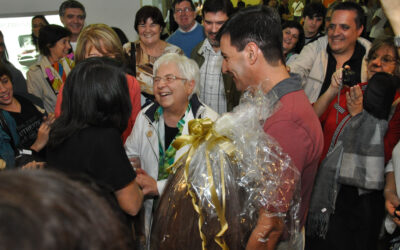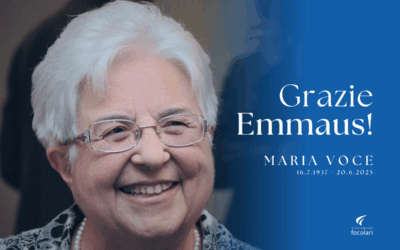 Nine business owners have enrolled in an EoC course in the small Central American country of Guatemala, a land with a strong indigeneous ancestry and sharp social contrasts.They have been delving into the fundamentals of the project on a monthly basis and examining experiences that are currently underway in other parts of the world. “The basic text,” course director, Sandra Macario, explains, “is Il prezzo della gratuità (Bruni), but we often have Skype link-ups with other EoC business owners in Mexico City and other Latin American countries.” An Open Day was held on November 26th for people who might be interested in an End-of-the-Year Breakfast which is customary in this area of the world with its traditional beans and corn dishes. The breakfast was attended by forty people. Maria Luisa Altamirano from Mexico was the guest of honour, who presented her experience as a business owner and responded to questions from the audience. Besides course members, Brazilian business owner, Ismael Yos, who attended the same course in Brazil, also spoke. The testimony of Guatamalen architect, Jose Mario Contreras, was exceptionally moving. He does not always have steady work, so he depends on a pool of workers whom he can call when he needs them. They know that work is scarce and realise that when they are not working for him, they must find whatever work can be found. At times workers are urgently needed, such as the time they had to restructure and fit out a Dyalisis Centre. Due to a cancellation of a contract with another company and susequent suspension of service, it became even more pressing. They were in need of builders to restructure the building and engineers to operate machinery. Contreras presented his bid, and all voted in favour, except for the delivery time which was reduced by half or else forfiet the job. It was an impossible problem. The last card he had to play was dialoging with the workers. Dialogue was a concept that Contreras had been implementing for some time, and he had introduced it as one of the foundations of his work activity, a lifestyle that has proven to be efficacious at such critical times. His proposal to the workers of working double shifts was unanimously accepted, not only because they did not want to lose out on the job, but because they trusted him and one another. Contrary to all technical predictions the job was finished on time, and the patients who were waiting recieved treatment on the date that had previously been agreed on. On another occasion Contreras had received a telephone call from one of his employees. It was early in the morning, too early to disturb the boss. But it was serious: his small daughter was ill and in urgent need of a certain medication that was too costly for the employee. Contreras listened to him like a brother: “For now I’ll begin to pray for your daughter,” he told him. “As soon as the bank opens, I’ll send you the money you need.” Contreras had the feeling that his company “had become a family.”
Nine business owners have enrolled in an EoC course in the small Central American country of Guatemala, a land with a strong indigeneous ancestry and sharp social contrasts.They have been delving into the fundamentals of the project on a monthly basis and examining experiences that are currently underway in other parts of the world. “The basic text,” course director, Sandra Macario, explains, “is Il prezzo della gratuità (Bruni), but we often have Skype link-ups with other EoC business owners in Mexico City and other Latin American countries.” An Open Day was held on November 26th for people who might be interested in an End-of-the-Year Breakfast which is customary in this area of the world with its traditional beans and corn dishes. The breakfast was attended by forty people. Maria Luisa Altamirano from Mexico was the guest of honour, who presented her experience as a business owner and responded to questions from the audience. Besides course members, Brazilian business owner, Ismael Yos, who attended the same course in Brazil, also spoke. The testimony of Guatamalen architect, Jose Mario Contreras, was exceptionally moving. He does not always have steady work, so he depends on a pool of workers whom he can call when he needs them. They know that work is scarce and realise that when they are not working for him, they must find whatever work can be found. At times workers are urgently needed, such as the time they had to restructure and fit out a Dyalisis Centre. Due to a cancellation of a contract with another company and susequent suspension of service, it became even more pressing. They were in need of builders to restructure the building and engineers to operate machinery. Contreras presented his bid, and all voted in favour, except for the delivery time which was reduced by half or else forfiet the job. It was an impossible problem. The last card he had to play was dialoging with the workers. Dialogue was a concept that Contreras had been implementing for some time, and he had introduced it as one of the foundations of his work activity, a lifestyle that has proven to be efficacious at such critical times. His proposal to the workers of working double shifts was unanimously accepted, not only because they did not want to lose out on the job, but because they trusted him and one another. Contrary to all technical predictions the job was finished on time, and the patients who were waiting recieved treatment on the date that had previously been agreed on. On another occasion Contreras had received a telephone call from one of his employees. It was early in the morning, too early to disturb the boss. But it was serious: his small daughter was ill and in urgent need of a certain medication that was too costly for the employee. Contreras listened to him like a brother: “For now I’ll begin to pray for your daughter,” he told him. “As soon as the bank opens, I’ll send you the money you need.” Contreras had the feeling that his company “had become a family.”
Live fully in the present
Live fully in the present




0 Comments